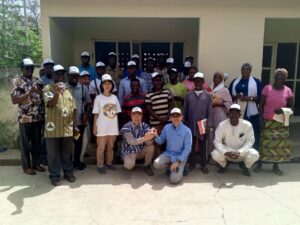Farmers count the benefits of grasscutter farming
 Some farmers in the Upper West Region say Grasscutter farming is one of the impactful alternative livelihood activities for people irrespective of occupation due to its economic potential.
Some farmers in the Upper West Region say Grasscutter farming is one of the impactful alternative livelihood activities for people irrespective of occupation due to its economic potential.
“Everybody likes grasscutter meat so if I send it to the market now, I can sell it to cater for the needs of my children like health, education and feeding, it is very helpful to me,” Mr Jevase Maaleyel, a farmer from Nandom, said.
He said this in Wa during the Ghana Grasscutter Project training workshop on the theme: “Six years of Ajinomoto Foundation Support: progress and the way forward.”
He said it served as a source of protein for his family while the droppings served as manure for crop production.
Mr Naadao Aziz, another farmer from Wa, indicated that keeping the grasscutter was not difficult and encouraged other people to venture into grasscutter farming.
Currently, there are about 40 grasscutter farmers in the Upper West Region being supported by the Grasscutter Initiative for Rural Transformation (GIFT) under the Ghana Grasscutter Project.
The project was introduced in the Upper West Region in 2014 through the collaboration of the University of Ghana and Kyoto University, Japan, to support farmers in the region to rear grasscutter to augment family income, improve protein intake and promote environmental and wildlife conservation.
Professor Miho Murayama, a Director of the GIFT, said keeping livestock such as cattle in northern Ghana was gradually becoming difficult due to the harsh weather conditions hence the decision to promote grasscutter farming, which could survive in such weather conditions.
“During the dry season farmers are less busy so it is an alternative source of livelihood for the farmers, and it can be a sustainable source of income for the farmer because it is in high demand in the market,” she said.
She added that due to its enormous benefits, GIFT would continue to support grasscutter farmers in the region.
Prof. Murayama, also a professor at Kyoto University, added that hunting was the main source of grasscutter meat, which was also inimical to the environment since some hunters resorted to bush burning.
She thus encouraged more farmers to venture into grasscutter farming as it was a lively, productive, and easy venture to embrace.
Dr. Boniface B. Kayang, also a Director of GIFT, said grasscutter farming prevented people from interacting with animals in the forest and reduced the risk of zoonotic infections from animals to humans and vice versa.
He indicated that the economic value of a grasscutter was high saying, “Grasscutter is good, a lot of people like it and the market is there.”
Dr. Kayang said a grasscutter could produce offspring up to 15 at ago with a gestation period similar to that of a goat and appealed to the government to support the project with a pelleting machine to produce feed for the animals.
The Ajinomoto Foundation (TAF) is currently funding the project to scale up grasscutter farming in the region and to support the processing of grasscutter meat to attract the international market.
Mr Kenji Shinkai, the Manager of TAF, said they decided to support the project because of its potential to improve the nutrition situation in the region.
Mr Titus S. S. Dery, a staff of GIFT in charge of Information and Education, observed that people including hunters sold grasscutter meat in its raw form along the highways and in local markets.
He said they would soon commence processing grasscutter meat into cans for both local and international markets.
Dr. Christopher Adenyo, the Project Coordinator, emphasised the economic potential of grasscutter farming including the availability of a market as it was a delicacy for many people and said they were researching to produce improved glasscutters.
Grasscutter farmers across the region, who participated in the workshop, were taken through a series of presentations on grasscutter farming and were presented with certificates of participation.
Source: GNA
